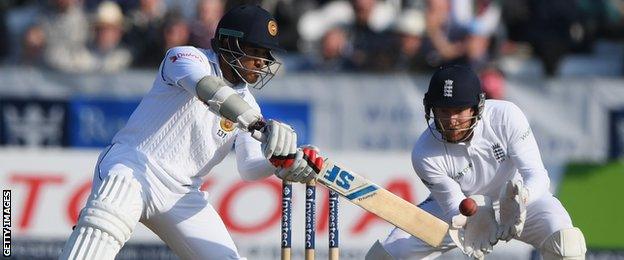England v Sri Lanka: James Anderson brilliant but Steven Finn still struggling
- Published

James Anderson is the leading wicket-taker in the series with 18 - 10 more than anyone else
Generally speaking, England will be very happy to have won the Test series against Sri Lanka without really breaking sweat.
Even though they did not finish the job quite as quickly as they did in the first Test, their nine-wicket win in the second Test at Chester-le-Street was still very comprehensive, and Sri Lanka were never really in the game.
England coach Trevor Bayliss rated their performance an eight out of 10. I'd give them a seven - they are still not quite firing on all cylinders and, as captain Alastair Cook admitted, there were moments when they took their foot off the pedal. But that is probably being picky.
It is always hard to accurately assess a team when their opponents are poor, as Sri Lanka have been for most of this series.
But one thing is clear: James Anderson is bowling absolutely brilliantly. Even if he was up against top-class batsmen, he would still be making the ball do the same things.
He is at the top of his game and his elevation to the top of the Test bowling rankings is richly deserved.
A tale of two bowlers
Fast bowling is such a fickle game, and so much of it depends on rhythm - the elusive code that is so hard to describe or quantify. Anderson was bereft of rhythm in South Africa, but suddenly he is running up happy again, 'kissing' the pitch and taking stacks of wickets.
You could argue that better batsmen would play him better, but in these conditions, moving the ball both ways, Anderson is a dangerous proposition for anyone on the planet.
You cannot underestimate the importance of the overs he bowled for Lancashire earlier in the season, taking 12 wickets at an average of 20.75 in three matches.
No matter who you are and how much Test cricket you have played, you do not get your rhythm back in the nets.

Steven Finn has taken just four wickets at 34.50 in this series
What a contrast with Steven Finn. Finn was arguably the bowler of the series in South Africa, where Anderson struggled, but now his rhythm seems to have deserted him again.
He is not doing anything wrong - I know well from my own playing days that sometimes you can run in with just as much effort and think you are letting the ball go just as fast as always, but it just does not come out with the same snap.
What worries me is that he has got no opportunity to rediscover his rhythm before the final Test at Lord's begins on 9 June - there is only one T20 Blast match for Middlesex that he could possibly play in.
Finn has to play at Lord's. There has been some talk that England might want to have a look at Jake Ball, who has been in the squad for the first two Tests, but he can bide his time. Finn knows Lord's well and this might be his opportunity to get some form back.
Areas for improvement?
Even when you are winning, you must look to move the team on, and there are a couple of areas that will be causing the England management some concern at the moment.
Jonny Bairstow has been brilliant with the bat this summer but his wicketkeeping remains a work in progress. He does make mistakes: he drops catches and misses stumpings.
It is a very hard job, and slow-motion replays can be very cruel on keepers because you think 'how has he missed that?' But it happens in an absolute flash.
But I do not think his position behind the stumps is under threat. Unfortunately, those misses can sometimes be costly and, if he makes too many, his place as a keeper will come under scrutiny.

Jonny Bairstow has 16 dismissals in the series
The other problem is the form of Nick Compton at three. Although he will be mighty relieved to have got 22 not out in the second innings as England chased 79 to win in Durham, his problem is that he has not scored heavy runs all summer - for England or Middlesex.
Lord's is a ground he knows well and he will be desperate to do well. It will be a flatter pitch than we have seen so far this summer and the conditions should be easier for batting.
If England can win the toss and bat first, he will have a really good opportunity to nail down that position - that is the way he will be looking at it.
I do not think his England place necessarily hinges on how he plays in the third Test - there is quite a big break between that game and the first Test against Pakistan on 14 July and he could go away and score a stack of runs for Middlesex.
But if he does not get a score people will be looking at him even more.
Cook's crowning achievement
One man whose place certainly is not under scrutiny is Cook. What an incredible achievement for him to become the first Englishman to reach 10,000 Test runs.
He has done it in the hardest possible way - opening the batting, much of it with the burden of captaincy, and with uncertainty over his partner at the other end. Those are three ingredients with which most people would find incredibly difficult to succeed.
You must have absolute admiration for him. He is not a stylist and he does not have people dashing in to watch him, but that is Test cricket.
You need players like Cook to blunt attacks and lay the buildings blocks of an innings for the team. He has fulfilled that role absolutely brilliantly, and he will go on.
For a while, he was as obdurate with his captaincy as he was with his batting and, as a skipper, you do not really want that. But he has definitely opened up over the past year and his confidence has grown enormously.
Yet he can still go out to bat, put everything away and focus on what he has to do with a bat in his hand - and that is a great testimony to him.
That focus has been in some ways Cook's defining quality as a Test batsman, and it was in evidence right from the very beginning.
I remember him arriving in Nagpur after that long journey from the West Indies, just two days before making his debut, and he made 60 and a hundred.
You thought, 'this bloke's pretty special', because he can focus totally on batting. Long may he continue.
Jonathan Agnew was speaking to BBC Sport's James Gheerbrant.
- Published31 May 2016

- Published30 May 2016

- Published30 May 2016

- Published30 May 2016
- Published10 March 2019

- Published15 May 2018

- Published18 October 2019

